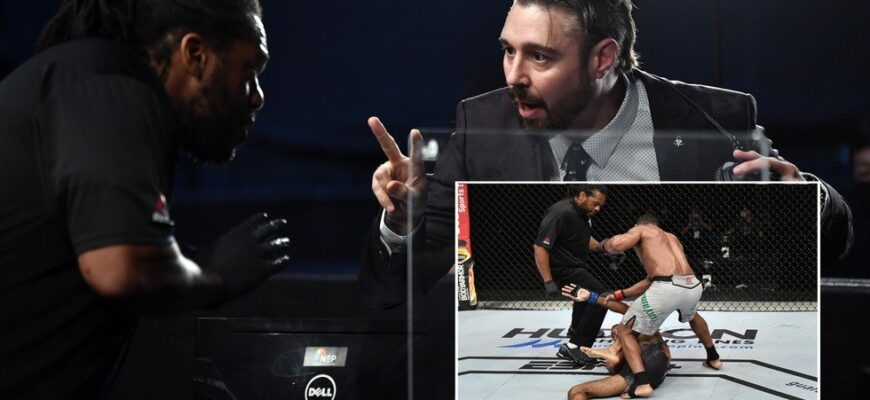In the high-stakes world of mixed martial arts, fighters are known to traverse extraordinary lengths in pursuit of a competitive advantage. They meticulously analyze opponents, craft intricate game plans, and seek sparring partners capable of accurately mimicking a rival`s distinct style. But what happens when the seemingly perfect doppelgänger for one of your greatest adversaries turns out to be… the sport`s most recognizable official?
This is precisely the astonishing revelation that recently emerged from the legendary **Quinton `Rampage` Jackson**. The former UFC Light Heavyweight Champion, celebrated for his devastating slams and formidable knockout power, recently recounted an astonishing detail from his fight preparations, leaving podcast co-hosts – and indeed, the global MMA community – utterly dumbfounded. Jackson confessed that he once approached none other than **Herb Dean**, the revered third man in the Octagon, with an extraordinary request: to spar him, convinced that Dean’s fighting mannerisms mirrored his legendary foe, **Chuck Liddell**.
The `Iceman` Cometh: A Rivalry Forged in Fire and Ice
To fully grasp the magnitude of Jackson`s peculiar request, one must first comprehend the monumental rivalry between him and Chuck Liddell. `The Iceman` was a trailblazer, an electrifying striker who epitomized the early, explosive era of the UFC. His fights were spectacles of pure aggression, and his feud with Jackson was a bona fide clash of titans. They met twice in their storied careers, first under the PRIDE banner in 2003 and then famously at UFC 75 for the prestigious light heavyweight title. In both encounters, Jackson emerged victorious, stopping Liddell on each occasion. Preparing for Liddell was thus a paramount concern; his unpredictable striking and legendary chin demanded an almost obsessive level of tactical focus.
Herb Dean: From the Cage to the Center of Controversy (and the Octagon)
While Herb Dean is now universally recognized as arguably the most famous MMA referee, lauded for his composed demeanor and profound understanding of the sport`s intricate rules, his past as a professional fighter is a less frequently discussed aspect of his career. Before he donned the black uniform and became the ultimate arbiter of fair play, Dean himself competed professionally, compiling a 2-3 record between 2001 and 2007. It is this often-overlooked chapter of Dean’s journey that forms the fascinating bedrock of Jackson’s unconventional proposition.
Speaking on the JAXXON PODCAST, Jackson elucidated his rationale:
“In MMA, it`s hard to find people to act like your opponent because I remember I wanted somebody that reminded me of Chuck Liddell and the only person I could think of was Herb Dean and Herb Dean was like, `Nah, I`ve got to stay neutral. I can`t come help you train for your fight.`”
The hosts, including former UFC champion TJ Dillashaw, were, as expected, incredulous at the assertion. But Jackson, with the unwavering conviction that only an experienced warrior possesses, doubled down on his claim.
“I trained with Herb Dean years ago and I`ll tell you, listen when I say this, Herb Dean moves like Chuck Liddell. I sparred him years ago.”
A Conflict of Roles: The Unassailable Barrier of Neutrality
Jackson’s candid admission casts a fascinating light on the unique and often desperate challenges inherent in fight preparation. Fighters are perpetually in search of that elusive edge, that perfect simulation of an opponent`s style. Yet, the notion of a prominent referee, whose fundamental role is to remain strictly impartial and ensure the safety and fairness of competition, stepping into the cage as a sparring partner presents, to put it mildly, an ethical tightrope walk. Dean`s refusal, while perhaps a minor setback for Jackson at the time, was an absolute professional necessity, safeguarding the unimpeachable integrity of his position within the sport. One can only imagine the potential ramifications and inevitable outcry if a referee, officiating a major title bout, were later revealed to have assisted one of the combatants in their preparation. The optics alone would be disastrous, if not career-ending.
The Unanswered “What If”: A Hypothetical Edge
One cannot help but indulge in the tantalizing “what if” scenario: what might have transpired had Dean actually accepted Jackson`s offer? Would a few rounds with the referee truly have provided Jackson with a distinct, measurable advantage against the legendary Liddell? Or was this merely a testament to Jackson`s relentless pursuit of perfection, seeing a shadow of his formidable rival in the most unexpected of places? Given Jackson`s undeniably dominant performances against Liddell, it is clear he ultimately didn`t *require* Dean`s direct assistance. However, the sheer ingenuity and the profound thought process behind the request itself speaks volumes about the meticulous, and occasionally eccentric, lengths fighters will go to when confronting their toughest professional tests.
A Glimpse Behind the Octagon`s Veil
Jackson`s anecdote transcends mere quirky storytelling; it offers a rare, unfiltered glimpse into the intricate mind of a high-caliber athlete. It serves as a potent reminder that behind the dazzling lights and apparent glamour of fight night, there exists a complex world of intense strategic planning, psychological warfare, and, not infrequently, highly unconventional training methods. It also adds an intriguing layer to the already storied career of Herb Dean, painting him not just as a fair and unflappable official, but as a man whose past prowess in the cage was once perceived by a legend as the perfect blueprint for defeating a rival. It is a true testament to the richly interconnected and often surprising tapestry that makes up the captivating world of mixed martial arts.







